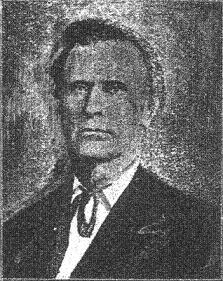
Elder A. P. Williams, D. D.
By Ben M Bogard

A. P. Williams was born in St. Louis county, Mo., March 13, 1813. He was a son of Lewis Williams, who was a preacher of great power. He also had three brothers who were preachers of ability, viz: Perry D. Williams, I. T. Williams and M. F. Williams. His nephew, Eld. J. D. Murphy, D. D., is also a preacher of decided ability, and has through a long ministry met with good success.
Eld. A. P. Williams was a self-made scholar. He was proficient in Greek and Hebrew, as well as an excellent scholar in his mother tongue. He was a master of the English language, as those who have heard him preach and those who have read his books will testify.
As a theologian he was without a superior in his day. He was looked upon by those who knew him best as a second Andrew Fuller. He could repeat whole chapters of the Bible from memory, and if the Bible had been utterly destroyed, it is said that he could have reproduced nearly all of it, exactly as it is written, while he could have reproduced the substance of all of it.
As a result of his wonderful knowledge of the Scriptures his preaching was preeminently scriptural.
[p. 83]
He literally "preached the Word" - he "was mighty in the Scriptures." He knew philosophy, and he knew full well that philosophy is not able to save, and he, therefore, "preached the preaching that the Lord bid him to preach." O that his mantle might fall on ten thousand of the rising ministry.
Dr. Williams gave his whole time to study, preaching, writing and pastoral duties. There were near four thousand conversions and baptisms under his preaching. He never took a rest, but rode on horseback, or walked, with an occasional steamboat ride, from place to place, and preached day and night for months at a time. As a preacher he was eminent. His eloquence, pathos and earnestness would set all his sermons on fire and move and melt the people. To this may be added a wonderful gift of exhortation, power of appeal, and a certain winsomeness of manner which is now seldom seen.
He was pastor at Lexington, Richmond, St. Joseph, Miami, Bethel, Rehoboth, Good Hope and Glasgow churches, all in Missouri. These churches prospered under his ministry, and there are many still living who bear loving testimony to his worth as a preacher and pastor.
The title of Doctor of Divinity was conferred on him twice, once by Georgetown College and afterward by Bethel College, of Kentucky.
He died in Glasgow, Mo., Nov. 9, 1868, while yet a young man - fifty-five - and while in the midst
[p. 84]
of a successful pastorate at Glasgow. His death moved almost every Baptist heart in Missouri, as well as thousands in other States. Truly a "great man and a prince in Israel had fallen."
He left to the world a good name, which is more valuable than riches, an impress for good upon thousands of characters which, by his preaching and writing, he had helped to form, and he published three books which are still blessing the world; one on Baptism, another on Communion, and still another on Campbellism Exposed. This last book is decidedly the best that has ever been written on that subject, and no one has ever had the temerity to attempt to answer it.
Dr. Williams was a debater of great skill. He had numerous discussions, both oral and written, but the details and incidents of these debates are lost to the world. It is to be regretted that all of his notes and memoranda have been destroyed, and the author is indebted to the Baptist Encyclopedia and to his nephew, Dr. J. D. Murphy, of Charleston, Mo., for the facts concerning this great life found in this sketch.
While we are not able to learn all the facts about this great man, we may be sure that all of his deeds have been recorded in a book which shall one day be laid open for all the world to read, and few other men will have a better record.
"He was a faithful man, and feared God above many." - Nehemiah 7:2. ================ [Ben M. Bogard, editor, Pillars of Orthodoxy, or Defenders of the Faith, 1900. Scanned and formatted by Jim Duvall.]
Pillars of Orthodoxy Index
Baptist History Homepage